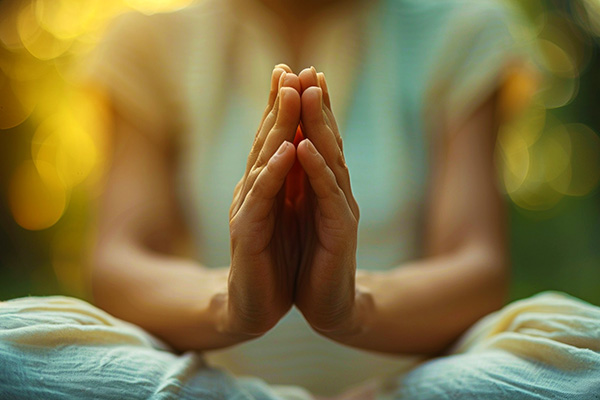spiritual traditions
Seeing The Spiritual Essence In Others
 My world was turned upside down when my father was diagnosed with pancreatic cancer. For seven agonizing months in 2005, I became his caregiver, managing the extreme emotional and physical toll of his illness.
My world was turned upside down when my father was diagnosed with pancreatic cancer. For seven agonizing months in 2005, I became his caregiver, managing the extreme emotional and physical toll of his illness.
Even the hospice staff, experienced in end-of-life care, commented at the time that my father was not an easy patient to care for. Their observation confirmed my own feelings on the matter and highlighted the unique challenges of the difficult karmic relationship I had with my father.
Throughout this stressful time, I held out hope for a miracle. I felt compelled to seek guidance, but unfortunately Spirit revealed a timeline of six to twelve months. This devastated me at the time, but I’ve since come to accept that arrivals and departures are part of every soul’s journey. Spirit was simply confirming a poignant truth: at some point we are all called home to the spirit realm.
Despite his resistance to any form of treatment, my father allowed a trusted colleague of mine, a master in his healing modality, to visit our home weekly for body alignment sessions. These sessions became a turning point — not only for my father, but for me as well.
During their second session, my healer friend shared an observation that struck a deep chord. He sensed an immense amount of bitterness and resentment in my father, energies he had perceived without any prior knowledge of my father’s emotional state or life history. He then offered me a piece of wisdom that changed the way I viewed not only my father, but all of my relationships: “Try to see only the true spiritual essence that is your father.”
How To Deal With Negativity And Toxic Drama
 Many people today feel overwhelmed, angry, frustrated, fearful. This is especially evident online in the social media landscape. Unfortunately, too often this leads to attacks on others, including innocent people and companies.
Many people today feel overwhelmed, angry, frustrated, fearful. This is especially evident online in the social media landscape. Unfortunately, too often this leads to attacks on others, including innocent people and companies.
It can be challenging to know how best to deal with all this toxic negativity. I believe it’s best to approach this issue spiritually, from a metaphysical or energetic standpoint.
Energy, whether positive or negative, grows when we feed it. Consider a plant: in order to thrive, it needs water, sunlight, and nutrients from the earth. If neglected, it will wither. The same principle applies to our interactions with the world around us: by paying attention to something, we feed it with our energy.
This is crucial to remember when dealing with any kind of negativity, both online and in person. To thrive energetically, we must be selective about who and what we pay attention to.
Huna, an ancient Hawaiian spiritual tradition, teaches that energy flows where attention goes. Every time we choose where to direct our energy, we’re making an active choice about what we want to grow in our lives. When we respond to negativity – whether with anger, defensiveness, or frustration – we end up reinforcing the very things we want to avoid. To maintain peace and harmony, huna advises focusing on positive intentions and constructive energy.
By giving toxic energy thieves our attention, we allow their negaivity to take root in our hearts and minds. Feeding negativity or drama only strengthens it, which ultimately affects our own well-being. When we consciously choose to withdraw our energy from negative influences and redirect it to uplifting and positive areas, we create an environment where peace and growth can flourish.
The Magic Of Dowsing Stands The Test Of Time
 Dowsing, also known as “divining” or “water witching,” is an ancient practice that uses a tool such as a pendulum or divining rod to locate what is hidden, most commonly underground water, minerals, or lost items. it is also a divination method used to tap into the unseen or mystical to gain spiritual, psychic, or energetic insights.
Dowsing, also known as “divining” or “water witching,” is an ancient practice that uses a tool such as a pendulum or divining rod to locate what is hidden, most commonly underground water, minerals, or lost items. it is also a divination method used to tap into the unseen or mystical to gain spiritual, psychic, or energetic insights.
While skeptics dismiss it as pseudoscience, dowsing has persisted in many cultures for thousands of years, standing the test of time as a mysterious blend of mysticism and physics. I believe its continued presence throughout history speaks to its importance and continued relevance in today’s technological society.
Dowsing has ancient roots dating back thousands of years, although its exact historical beginnings remain uncertain. Archaeological evidence suggests that the practice dates back to ancient Egypt and China, where early civilizations used rudimentary dowsing techniques to locate water and minerals. Cave paintings in North Africa from around 8000 B.C. depict people holding forked sticks, which many experts believe may be dowsing rods.
The ancient Greeks and Romans were also familiar with dowsing, especially for locating underground water sources. They considered the dowsing rod or pendulum a sacred tool capable of tapping into hidden energies. It was believed that certain materials, especially wood or metal, could act as conduits for detecting invisible forces in the earth.
In the Middle Ages, dowsing became more widely practiced in Europe, often by miners searching for metal veins, especially during the mining booms in Germany and England. However, due to its inexplicable, mystical nature, dowsing also increasingly became associated with the occult and witchcraft, leading to its condemnation by the church.
Start Living Your Best Life, Today!
 Many years ago, my work took me to the lavishly decorated penthouse of a client who was a retired physician. I remember being in awe of the magnificent collection of books that lined the walls of his home.
Many years ago, my work took me to the lavishly decorated penthouse of a client who was a retired physician. I remember being in awe of the magnificent collection of books that lined the walls of his home.
“Your book collection is truly amazing,” I remember saying as I entered his beautiful home.
“Well, I worked very hard all my life, and one of my little pleasures outside of work was to buy all the books I felt inspired to read. Unfortunately, because I was always so busy and worked very long hours, I had put off reading most of them. But I constantly reminded myself that one day, when I retire, I would read all these wonderful books,” he said. “Unfortunately, it is too late for that now.”
It was too late…because he had tragically gone blind from an illness.
I will never forget that heartbreaking moment, standing in that lovely room lined with some of the most wonderful works of literature ever published. To this day, it reminds me of the importance of doing the things that bring us joy while we can.
The moral of the story is that although the blind doctor did wonderful things for his patients and the medical profession, he didn’t take much time for his own joy and fulfillment in the present moment.
This is why we need to live our lives in the now! Too often we put off our passions because we think there’s always time. But living fully in the present allows us to appreciate each moment, which fuels joy and fulfillment.
Honor Your Pagan Heritage This Halloween
 Samhain holds special significance for those who practiced paganism in a past life, especially those who were involved in magical practices as seers, soothsayers, druids, and witches.
Samhain holds special significance for those who practiced paganism in a past life, especially those who were involved in magical practices as seers, soothsayers, druids, and witches.
For us, this time of year evokes a deep sense of nostalgia, spiritual reorientation, and a return to ancient wisdom as the veil between worlds thins and we reconnect with our ancestors and the spirit realms.
Samhain is an ancient Celtic festival marking the end of the harvest season and the beginning of winter, traditionally celebrated from October 31 to November 1. It is one of the four great Gaelic seasonal festivals, along with Imbolc (February 1), Beltane (May 1), and Lughnasadh (August 1).
In Celtic tradition, Samhain (pronounced “sow-in”) is a liminal time when the boundary between the physical and spiritual worlds is thinner, allowing the spirits of our deceased loved ones, ancestors, and other spirits to cross over more easily.
In ancient times people would light fires and wear costumes to ward off harmful spirits, while also honoring their ancestors with offerings of food and drink.
Samhain is considered the origin of modern Halloween traditions, although Halloween has evolved and incorporated elements from other cultures to become a mostly secular and commercial holiday. For Neopagans and Wiccans, Samhain remains an important festival for honoring the dead, celebrating the cycle of life, death, and rebirth, and connecting more deeply with the spirit realm.
A Samhain Invitation From The Faeries
 Fairies love fun and joyful games in the great outdoors, even during the darker seasons of the year. I am reminded of this every year at this time when the veil between the worlds thins during the mystical season of Samhain and Halloween.
Fairies love fun and joyful games in the great outdoors, even during the darker seasons of the year. I am reminded of this every year at this time when the veil between the worlds thins during the mystical season of Samhain and Halloween.
If you’re currently experiencing a highly creative period or feeling called to get out into nature, even if it’s just to your garden before the weather gets too cold, there’s a good chance you’re also being invited to have some fun and free-spirited playtime with the fairies.
It is easiest for us to connect with the Faeries or Fae during the times of the year when the seasonal energy portals are open at the cross-quarter holidays of the Summer and Winter Solstices and the Spring and Fall Equinoxes.
These seasonal transitions are also traditionally celebrated in the ancient pagan festivals and religious holy days of Imbolc (St. Brigid’s Day) on February 1st, Ostara (Easter) on around March 21st, Beltane (St. Walburga’s Day) on May 1st, Litha (St. John’s Day) around June 20th or 21st, Lammas (Day of Bread) on August 1st, and Samhain (All Saints’ Day) on October 31st.
Traditionally celebrated as a time to honor our ancestors and reflect on the cycle of life and death, Samhain on October 31st marks the halfway point between the Autumnal Equinox and the Winter Solstice. It is a special time that invites us to step beyond the ordinary into the realm of magic and mysticism. The lingering echoes of autumn and the approaching winter in the Northern Hemisphere also foster a sense of introspection and connection to nature, making it an optimal time to commune with the ethereal elementals of nature.
